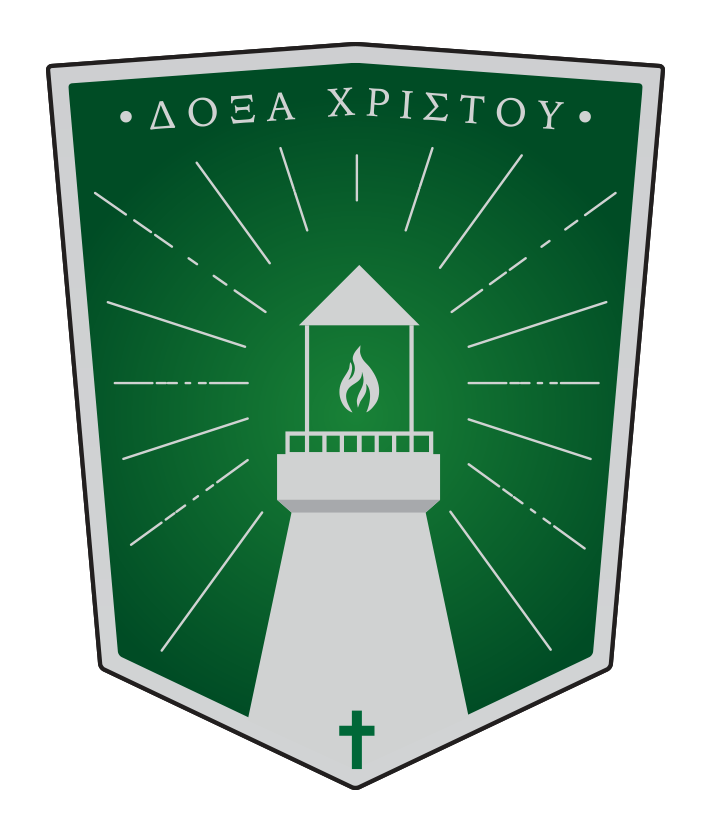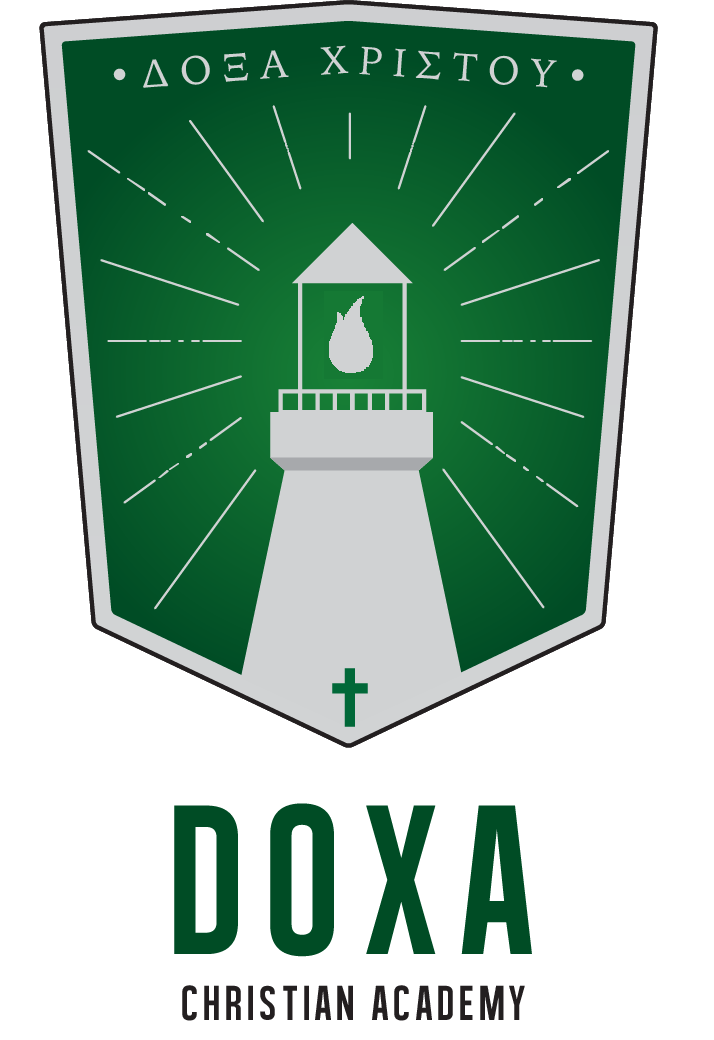What is one thing that we know for sure that we will be doing in heaven? Playing video games, organized sports, doing math problems, or something else? Revelation 5:9, 14:3, 15:3
What did John Newton write in his famous hymn, "Amazing Grace?" Fill in the blank: "When we've been there ten thousand years......we've no less days to _____ God's praise...." Is the answer "watch organized sports to God's praise?"
Christians are commanded to sing in the New Testament. As people who have been redeemed by the blood of Christ and rescued from our sins, what higher reason can there be for singing?
Singing should be as comfortable for us as speaking (Zephaniah 3:17, Job 38:7).
Singing and music at Doxa Christian Academy will adorn the life of our school and not serve merely utilitarian purposes or serve as adjuncts to our sports programs. We're not just making Facebook moments at school performances–we're getting a generation of young Christians to make music. Our goal is for our students to become musically literate (not to become vocational musicians, although some of them might), just as they will be literate in English and other languages.
We are worshippers all day, every day. Our students are worshippers all day, every day, and are growing into young adults who will continue to do the same in their adult lives and callings, wherever God places them. We are not doing "music appreciation"--our kids are active participants in music and will be doing music all the way through their senior year. Just as rhetoric level students don't "appreciate" chemistry or algebra, our desire is to have all of our students actively engaged in making music; the primary means of this will be singing, but in due time we desire to add instrumental offerings as interest and budget allow.
At Doxa Christian Academy, we strive to train the affections of our students towards Christ in all things, including their tastes and aesthetic sensibilities. It is very difficult to tell someone or explain to someone how glorious something is or by lecturing them into it. One doesn't comprehend the glory of the Grand Canyon until one actually sees it in person. Glory is perceived firsthand through experience; we desire for our students to experience the glories of beautiful music firsthand as active participants. In order for this to happen, there needs to be a certain level of musical literacy in place.
While we recognize the validity of different music pedagogies, we desire our music classroom to be Kodály-based (pronounced "Co-DYE") for several reasons (it is not the only viable approach). Zoltan Kodály (1882-1967) was a Hungarian composer, musicologist and music educator. His pedagogical approach matches well with the classical Christian model of discipleship of children, in that it is based on using indigenous folk music from the culture of the nation that will naturally lead to the study and performance of the great masterworks of our Western heritage (this is similar to our children's literary journey--folk tales, fairy tales and fables eventually give way to chapter books that eventually lead to the literary masterworks of the English language). His goal was the musical literacy of the population of his home country, Hungary. Our goal is musical literacy for Christians serving in their local churches, homes and communities that God has placed them in. As a Christian school, we will also be using historic Christian hymns and other biblically-influenced music that contain treasured, rich theological truths, in addition to indigenous American folk music and the art music of our great Western heritage.
By the time our students have gone through a Kodály-based music class from kindergarten to 6th grade, they will have gained the necessary tools to be musically literate (this parallels English language literacy). Once students are completed with 6th grade and are entering into the logic stage (grades 7-9), the focus will shift to musicianship, which would still entail joyful singing.
We also desire to incorporate folk/communal dancing into our music classroom, and also eventually into the life of the school (here is an article that explains our rationale).
The ACCS's first published curricular guideline/handbook is on music, not Latin, arithmetic, English literature, etc. Ponder why this might be the case.
An additional resource is Jarrod Richey's "Bach To the Future: Fostering Musical Literacy Today."
An "Old-New" Way
Classical education is the historical approach Christians have used to raise their children. It produced great thinkers such as Galileo, Newton, Shakespeare, the Reformers, and America's founding fathers.
It is proven to prepare children for the whole of life, fostering virtuous character, critical thought, and effective communication. It orients their hearts to love the good, the true, and the beautiful. It creates life-long self learners by cultivating a love of learning. Such an education will prepare them for whatever God leads them to accomplish.
Hallmarks of Classical Education
Classical education is set apart from modern, progressive methods of education in the following ways:
- The beholding of the world's great works of literature, art and music (developing literacy in music to the level that great works can be performed and experienced first hand)
- The transfer of the history and heritage of Western civilization
- Instilling virtue and character
- An emphasis on the humanities and the liberal arts
- A focus on studying primary sources
- The teaching of Latin or another ancient, inflected language (we teach Biblical Greek)
- The historic Trivium (explained below)
The Goals of Classical Education
- Rather than focusing on subjects (math, history, science, etc.), classical education focuses on giving students the tools of learning. The subjects are just material on which to practice using the tools. The goal is that they will be ready to learn anything and that they will love learning for the rest of their lives.
- Rather than passing on content, classical education seeks to train the mind and the heart. It gives students experience with history's great thinkers, artists, scientists, and musicians, with the intention that they will conform their minds and hearts to that greatness.
What is the Trivium?
Classical education involves passing on the tools of learning, with which they can go on to learn anything in life. Three of the biggest tools are grammar, logic, and rhetoric, and each of these cuts with the grain of a child's development.
1) The Grammar Stage - A child in the grammar stage (corresponding to the elementary grades) loves reciting facts. Therefore, the grammar stage involves memorizing math, geography, history, and science facts. They learn to read through phonics. Key elements of this phase include rhymes, songs, chants, nature studies, narration, and skits.
2) The Logic Stage - A young person in their adolescent years (corresponding to middle school) enjoys challenging the adults in their lives and likes to argue. Consequently, much attention is given to the principles of logic, recognizing fallacious thinking, and arguing effectively and graciously. Additional elements of this phase include apologetics, Socratic discussion, the scientific method, and debate.
3) The Rhetoric Stage - Young men and women at the high school age level seek to find their place in the world. They are concerned about their appearance and identity. As a result, attention is given to presentation, style, and persuasiveness, along with ethics, civics, and mentorships. Additional elements of this phase include speech, mock trial, senior thesis, and practicums.
ACCS Alumni Statistics
Received a BA or higher in college
vs. 45% of homeschool alumniFelt well prepared for a job
vs. 50% of Christian school alumniEarned all or mostly all As in college
vs. 32% of Christian school alumniRead the Bible regularly
vs. 55% of Christian and homeschool alumniAttend church 3x per month
vs. 65% of Christian and homeschool alumniWanting More?
Visit our Association to read examples, results, and research of our Classical Christian Method.








